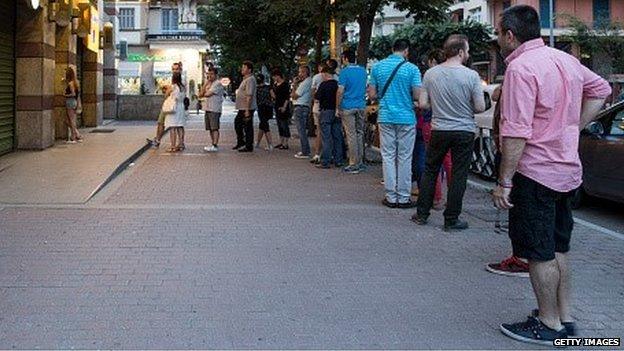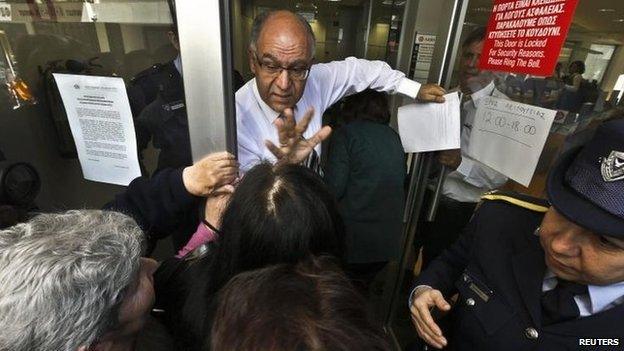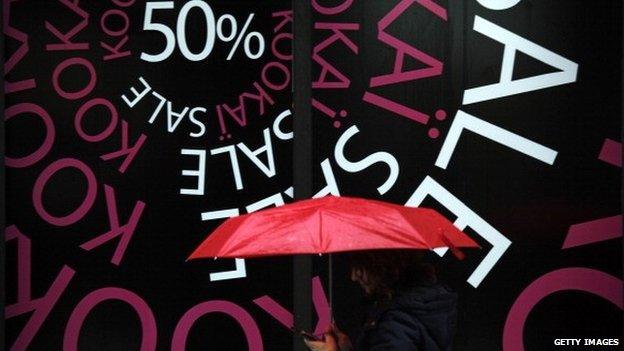Greek debt crisis: What are capital controls?
- Published
Greek banks have shut after Prime Minister Alexis Tsipras announced capital controls would take effect up to and including 6 July, meaning the amount of money people can withdraw from banks is being restricted.
Individuals are allowed to take out only €60 (£42; $66) a day for this period, although they can bank online more freely, so they can pay their bills online. They cannot move money to accounts abroad.
The move follows the European Central Bank's announcement that there would be no increase in emergency funding for Greece, and lending would be kept at the level set on Friday.
We take a look at what this actually means:
What are capital controls?

There are no signs that the rush to withdraw cash is going to abate any time soon
A government can use capital controls to order its banks to impose strict limits on daily withdrawals and overseas transfers of cash. It can also impose other measures such as limiting foreign exchange transactions.
In this case, it would be to prevent euros flowing out of Greek banks - to overseas banks, into a different currency, or even simply to be stashed under the mattress.
Until now, the Greek government had been signalling that it did not want to introduce such restrictions.
However, because the ECB's cash pipeline is frozen, the government has little choice.
I'm on holiday in Greece, what about me?
Credit and bank cards issued abroad can be used at cash machines freely - subject to queues and the amount of cash in them - so that visitors can continue to contribute to Greece's vital tourist industry.
In any case, their money is not coming out of a Greek bank ultimately, but their own national bank account.

What are the restrictions imposed in Greece?
Banks closed up to and including 6 July
Cash machine withdrawals limited to €60 per day
Card payments and online transactions in Greece allowed but not to accounts abroad
Tourists can use cash-points if they use cards issued abroad
Pension payments not affected: 1,000 Greek banks to open on Wednesday for pensioners without debit cards
Buses, trams and metro in Athens free during this period

Has any other eurozone nation had to introduce capital controls?

Cyprus's crisis-hit banks were forced to introduce capital controls in 2013
Only Cyprus, where capital controls were imposed on Cypriot banks in 2013 after a banking crisis and a subsequent bailout deal with the EU and IMF.
There, though, the limits were far higher, with daily withdrawals capped at €300 of cash per person per day.
Cypriots travelling abroad could take no more than €1,000 out of the country, while payments and/or transfers outside Cyprus via debit and/or credit cards was permitted only up to €5,000 per month.
Businesses could carry out transactions up to just €5,000 per day, and a special committee was created to review commercial transactions between €5,000 and €200,000. That committee also had to approve all commercial transactions over €200,000 on a case-by-case basis.
And the cashing of cheques was banned.
How long can capital controls remain in place?

Capital controls could hit all parts of the Greek economy, including retail
There's no standard period.
The general assumption with such emergency capital controls is that once the economic dust has settled, the panic withdrawals will end and the controls can be lifted again.
The longer they are in place, however, the greater effect they have on an economy. A tightening on business transactions and withdrawals of deposits could in turn affect sectors such as retail sales and tourism, and the commercial activity and industry of a country as a whole.
In Cyprus, controls remained in place for a long time. The last restrictions were not lifted until April 2015, after more than two years.
Are Greece's controls legal?

The ECB has to decide whether to continue providing assistance to Greek banks
All such moves fly in the face of the founding treaties of the European Union and the eurozone, which declare that money should be free to flow throughout the entire single currency area.
Indeed, one of the main reasons for European monetary union was to enable such free flows of money.
In Cyprus, the European Commission only allowed the introduction of the controls because it said there was significant risk "of complete destabilisation" of the financial sector.
The EC has also given its permission for Greece to impose these controls, saying it appears justified in breaching EU laws.
Its Financial Services Commission said in a statement: "In the current circumstances, the stability of the financial and banking system in Greece constitutes a matter of overriding public interest and public policy that would appear to justify the imposition of temporary restrictions on capital flows."
It added, though, that the free movement of capital would need to be reinstated as soon as possible.